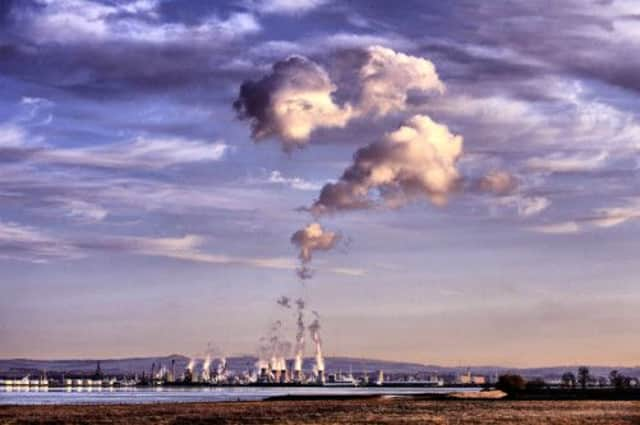Grangemouth: How downfall began with bar-room brawl


AS MPS lined up in parliament with vague demands for action to help save Grangemouth yesterday, it was left to Falkirk MP Eric Joyce to put the boot in.
At the root of the dispute, he told Energy Secretary Ed Davey, was the Unite union’s decision to “put a petty political point before a looming train coming down the track”.
Advertisement
Hide AdAdvertisement
Hide AdIt was apt for Joyce to be the one getting stuck in – as the path to the events in central Scotland yesterday began with his flying fists in a House of Commons bar 18 months ago. It is the political equivalent of the theory that a butterfly flapping its wings in China can culminate in a hurricane on the other side of the world.


In March last year, Joyce went “berserk” during a parliamentary drinking session, hitting at least three other MPs in an undignified brawl. He was arrested and fined for common assault. Already suspended from the Labour Party, he subsequently resigned and announced he would not be standing again at the 2015 general election.
So began the process of selecting a Labour candidate to replace him, to be chosen by local party members. In March this year, allegations began to emerge that Unite, led by the chairman of the Falkirk party, Stevie Deans, was signing up new members without their knowledge in order to get its favoured candidate, Karie Murphy, selected.
Specifically, Mr Deans, a Grangemouth employee and the plant’s union convener, was accused of recruiting fellow staff members.
In September, the Labour Party announced that Mr Deans and Ms Murphy had been exonerated, and declared it was dropping its internal investigation.
However, while Labour and the police let the matter drop, Grangemouth owner Ineos did not. Instead, it pressed on with an internal investigation into Mr Deans’ “alleged inappropriate use of company resources”.
This decision was a red rag to Unite, which accused Ineos of the “sinister” victimisation of Mr Deans. Ineos demanded the accusation be withdrawn or it would bring a libel action. Unite balloted members for industrial action over Mr Deans’ treatment. More than 80 per cent of workers backed a strike.
Into this escalating war, Ineos threw in the prospect that the giant plant may be facing a terminal crisis. The unions dispute the figure, but chairman Calum MacLean claimed losses amounted to £150 million per year for the past four years. At the end of September, the firm declared it needed government loans and cash of £135m to turn the Grangemouth plant around. Mr MacLean said staff would have to accept changes to pay and pensions to keep the plant viable. The cost-cutting was necessary, the firm added, if government support was to be forthcoming.
Advertisement
Hide AdAdvertisement
Hide AdIf a deal could be reached, he claimed, the firm would be able to invest £300m in building a gas terminal to bring ethane from the United States, and return to profitability.
A dispute over Mr Deans now morphed into a much wider one about cuts to the plant’s huge workforce, with the accusation being levelled at Ineos that it was deliberately setting up Unite to play the role of wrecker. The union, however, decided not to back down and, on 11 October, pressed the nuclear button, announcing plans for a 48-hour strike over Mr Deans’ treatment. As the plant began preparations to shut down, talks at conciliation service Acas commenced. According to Alex Salmond yesterday, the two sides were tantalisingly close to a deal. But instead, in the early hours of last Tuesday, they fell apart.
Unite’s Pat Rafferty claimed that at 5am, they received a demand from Ineos boss Jim Ratcliffe that they say sorry for the earlier accusations against the company, with a warning that failure to issue an apology would be a deal-breaker.
Unite refused but announced that morning that it was prepared to call off the strike for the coming weekend. But, holding all the cards, Ineos chiefs announced a shutdown of the plant. It would be reopened, they added, if the union agreed not to take further action before the end of March. In a further attempt to cut the union out of any rescue, Ineos offered a revised plan direct to Grangemouth staff, proposing to replace their final salary pension scheme with a money purchase scheme and offering them a lump sum of up to £15,000.
Mr Ratcliffe warned if the petrochemical plant closed, it was likely the refinery would go as well. He was putting a “gun to workers’ heads”, Unite claimed.
On Monday this week, 65 per cent of the plant’s Unite membership turned the deal down.
Mr Rafferty proclaimed the verdict as an “overwhelming rejection of the company’s blackmail and threats”. He called on shareholders to instruct the management at Ineos to get back to the negotiating table.
But yesterday the union bluff was called, as workers were informed that, with no deal in place, the petrochemical plant would be closed. In response, Unite declared that politicians in Edinburgh and Westminster should not look at securing financial assistance for the plant or even nationalisation. And the blame game had begun.
Advertisement
Hide AdAdvertisement
Hide AdGrahame Smith, of the STUC, slammed the “simply disgusting” behaviour of Ineos. He said: “It reveals the true nature of a feral private equity concern that clearly believes it has no social obligations whatsoever.”
As for the MP whose punch began the whole mess, Joyce concluded yesterday: “Ineos is a tough, world-scale company and exists to make as much money as it can. What did people think was going to happen once the company’s offer was rejected, following the stupidest of strikes for the most idiotic of reasons?”